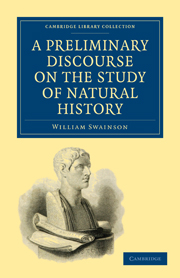Book contents
- Frontmatter
- Contents
- PART I RISE AND PROGRESS OF ZOOLOGY
- PART II ON THE GENERAL NATURE AND ADVANTAGES OF THE STUDY OF NATURAL HISTORY
- CHAP. I
- CHAP. II
- PART III OF THE PRINCIPLES ON WHICH NATURAL HISTORY RELIES FOR ITS SUCCESSFUL PROSECUTION, AND THE CONSIDERATIONS BY WHICH THE NATURAL SYSTEM MAY DE DEVELOPED
- PART IV ON THE PRESENT STATE OF ZOOLOGICAL SCIENCE IN BRITAIN, AND ON THE MEANS BEST CALCULATED FOR ITS ENCOURAGEMENT AND EXTENSION
- APPENDIX
- INDEX
- Frontmatter
- Contents
- PART I RISE AND PROGRESS OF ZOOLOGY
- PART II ON THE GENERAL NATURE AND ADVANTAGES OF THE STUDY OF NATURAL HISTORY
- CHAP. I
- CHAP. II
- PART III OF THE PRINCIPLES ON WHICH NATURAL HISTORY RELIES FOR ITS SUCCESSFUL PROSECUTION, AND THE CONSIDERATIONS BY WHICH THE NATURAL SYSTEM MAY DE DEVELOPED
- PART IV ON THE PRESENT STATE OF ZOOLOGICAL SCIENCE IN BRITAIN, AND ON THE MEANS BEST CALCULATED FOR ITS ENCOURAGEMENT AND EXTENSION
- APPENDIX
- INDEX
Summary
(55.) I. The nature and objects of the science having now been sufficiently explained, we may consider the advantages which more peculiarly attend its prosecution, independent of those which have already been noticed, in a general way, as belonging to all intellectual pursuits. We shall enumerate these advantages under distinct heads, because some are applicable only to particular persons, objects, or circumstances; and because, by so doing, we may excite an interest and a love for these enquiries in the minds of many persons, who imagine they have neither the abilities to study, nor the means of adopting such pursuits, and of others who think they are in no way interested in them. We shall therefore look to natural history — 1. as connected with religion; 2. as a recreation; 3. as affecting the arts and common purposes of life; and, 4. as an essential accomplishment to the traveller.
(56.) All the advantages that result from science, are comprehended under two distinct classes: — 1. Either they relate to our worldly prosperity, by opening new sources of wealth, of convenience, or of luxury; or, 2. they administer to intellectual gratification and our spiritual welfare. When, therefore, we speak of the advantages attending the prosecution of this science, we must readily admit that they chiefly belong to the latter class, although they may, in a limited degree, be applied to the former.
- Type
- Chapter
- Information
- A Preliminary Discourse on the Study of Natural History , pp. 107 - 151Publisher: Cambridge University PressPrint publication year: 2009First published in: 1834



